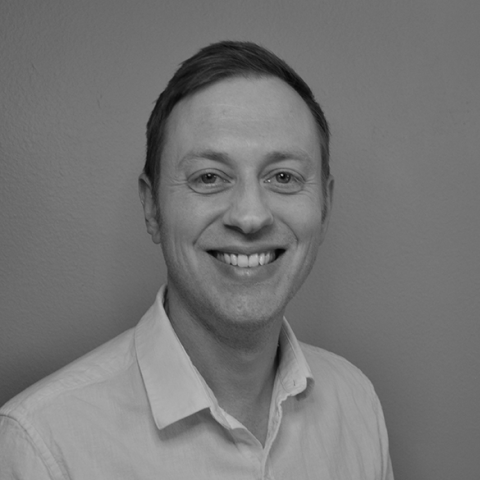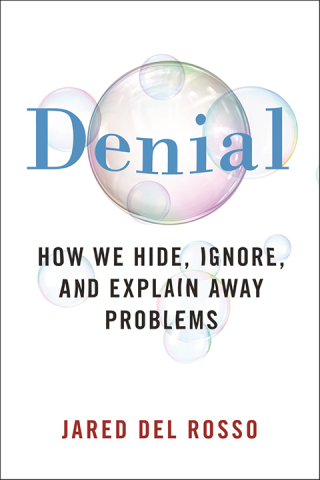Sociologist’s New Book: Denying Reality Is Common but Costly
In his new book, “Denial: How We Hide, Ignore, and Explain Away Problems” (New York University Press, 2022), Jared Del Rosso, an associate professor in the University of Denver’s Department of Sociology and Criminology, confronts the dangers of denial, drawing on some of his personal experiences and previous research to warn against denial’s all-too-costly toll. Via an email interview with University of Denver Magazine, Del Rosso explains how we come to practice and rely on denial.
How did you become interested in denial and its consequences?
I was in elementary school during Desert Storm, in high school during Operation Desert Fox, and in college at the start of the war in Iraq. Like most Americans, my understanding of these conflicts was refracted through politics and the media. So much was left unsaid. For instance, during the second Iraq war, the Department of Defense neither counted nor estimated the number of Iraqi casualties. And euphemisms, such as “collateral damage,” minimized the human costs of these conflicts.
In 2004, things changed. The release of photographs of U.S. torture at Abu Ghraib forced politicians and the media to reckon with violence. The photographs were “undeniable” in a sense. Politicians now had to at least admit that detainees had been mistreated in Iraq. So, I began studying the political response to Abu Ghraib and found a range of forms of denial in use. This work turned into a broader study of the denial of torture during the war on terror and my first book, “Talking About Torture: How Political Discourse Shapes the Debate.”
I owe the opportunity to think more broadly about denial to the unique teaching environments of DU, CAHSS [the College of Arts, Humanities and Social Sciences] and my department. I teach electives for both sociology and criminology majors, and my department offers faculty the opportunity to design original courses that reflect our teaching and research passions. In 2016, I designed a new course on denial. Students and I follow denial through all sorts of sociological and criminological contexts. That course is the basis of my new book on denial.
You write about denial on a large scale: denial about torture, denial about climate change, denial about things people might consider out of reach. But you also point to denial of problems in our own backyards. In the preface to your book, for example, you explain how the citizens of your hometown descended into denial over striking episodes of antisemitism and racism. What drives this kind of denial?
One thing driving this kind of denial drives most forms of denial: the human effort to avoid distressing emotions. The sociologist Kari Marie Norgaard has documented how emotions like fear, guilt and helplessness drive climate change denial, even among believers. I also think these forms of denial can cause a more general but deep discomfort. The work of acknowledging and addressing problems like climate change, human rights crimes or systemic racism requires a fundamental reckoning with power, privilege and identity. Denial offers people a way to avoid this.
You argue that we learn the ways of denial through socialization and maintain denial through social interaction. What do you mean by that?
Our first lessons in denial probably happen in our families. For instance, children are often admonished when they draw attention to people, behaviors or events that make adults uncomfortable. While everyday lessons like “It’s not polite to stare” or “Don’t point” are about teaching children tactful behavior in public, there’s also a subtext to these lessons: Adults prefer that we leave much of our lives undiscussed. We learn other lessons in denial in schools, as when school boards or state governments require schools to teach social studies in ways that erase histories of oppression.
Does denial have an upside? Is it ever useful?
I think there are some limited and narrow ways in which denial is useful. I write about these in “How Not to Notice,” the first chapter in “Denial.” In our everyday interactions with other people, we just can’t possibly acknowledge every minor disruption, mistake or blunder that we or others make. Not only is it not feasible, but it’s probably not desirable either, as it would disrupt the smooth flow of social interaction and heighten embarrassment. So, most of the time, we’ll engage in an important but fairly simple form of denial—we pretend that we haven’t noticed when things go wrong!
What are the consequences of sustained denial?
I think there are two important consequences of sustained denial.
The first is that the problems we’re denying will continue to harm people; they’ll also likely worsen. We see this with climate change, obviously.
Perhaps just as harmful, though, is that sustained denial of any problem slowly erodes our shared sense of reality and truth. To manufacture denial, corporations and politicians promote junk science, misinformation and propaganda. Public belief in major institutions inevitably suffers. So, too, does our faith in any shared fact or truth. We saw this happen with COVID-19. The pandemic was itself subject to considerable misinformation and denial. And yet sectors of the public had already been primed for these by decades of science denial and junk science, both by politicians and corporations.
An article on Del Rosso's new book appears in the winter issue of the University of Denver Magazine. Visit the magazine website for bonus content and to read this and other articles in their original format.




